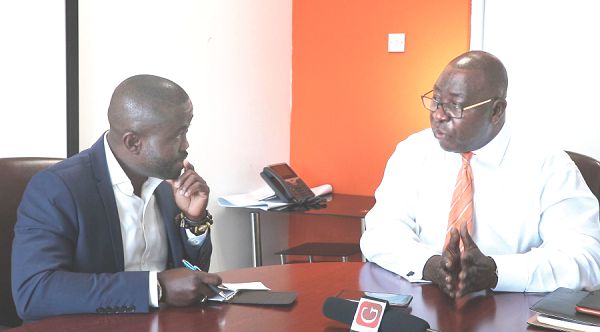
Relief for clients of microfinance firms; 23 to pay customers their due; Move to relieve State, taxpayer
Twenty-three micro-finance institutions (MFIs), which were collapsed by the Bank of Ghana (BoG) on May 31, have agreed to pay their customers from their own resources.
This means that customers of these companies will not be paid by the Receiver, Mr Eric Nana Nipah of PricewaterhouseCoopers (PwC) from the government resources that have been set aside for the exercise.
The development, which is expected to reduce the huge financial burden on the taxpayer and offer massive relief to the customers of those institutions, is expected to start tomorrow, August 28.
The Receiver of the defunct institutions disclosed this to the GRAPHIC BUSINESS in an interview last Friday, on the way forward for those institutions, following delays in the release of funds to their customers since the collapse of the 347 MFIs.
He explained that some microfinance institutions had told him that they were in the position to pay all their liabilities, including depositor liabilities.
“Twenty-three microfinance companies have approached me to say they will be able to pay their liabilities.
“By next Wednesday (August 28), we should be able to start paying depositors who belong to microfinance companies in this category,” Mr Nipah said.
Delayed payments
Some depositors have vehemently complained about what they described as ‘unwarranted delays’ in paying back their deposits, a phenomenon which is fast eroding their confidence and trust in the pledges and assurances made by the government and, for that matter, BoG.
But in a sharp response after he was quizzed on the matter, Mr Nipah said: “With regard to the microfinance companies, payments have slowed and we have come up with measures which, I believe, will sufficiently address these challenges”.
He did not specifically mention the challenges being encountered except to note that: “From what I am seeing, there will be a greater development and many more depositors will be paid, given the measures we have put in place.
“There will be a progressive growth in payments,” he added.
Maximum payments
On the issue of the maximum amount being released, he said: “We are paying close to GHȼ10,000 to depositors in the first round because the release of the money depends on the funds the government has provided.”
As to the number of customers being dealt with, Mr Nipah said: “With the microfinance companies, we have one million customers based on the data we obtained from BoG.”
Depositor’s pain
Good as the news sounds, there are still some lingering issues.
The GRAPHIC BUSINESS has gathered that some of the companies have decided to pay their customers only their principals and not the interest accrued on their investments.
The explanations offered for the excuse is that, there were some challenges with regard to their investments and, therefore, only the principals will be paid.
No further explanations have been offered except that the managers of those companies believed that their depositors should be lucky to get their full principals released to them.
One such customer, who gave her name only as Obaapanyin Boatemaa, described the phenomenon as most unfortunate and unacceptable because it constituted a breach of contract.
“They are taking advantage of us and that is unfortunate”, she said, expressing total regret for what she described as a complete waste of time.
To her, the development in the entire financial services sector smacks of lack of confidence, a phenomenon which could discourage the habit of savings and derail efforts at improving financial inclusion in the country.
Looming legal tussle
Meanwhile, the developments within the microfinance space are likely to spark a wave of legal tussles as some owners of the MFIs are planning to take on the central bank in court.
Managers of some of these institutions, who spoke to the paper on grounds of anonymity, said the BoG had acted in ‘bad faith’ and in too much haste.
In the process, they claimed that the central bank had brought down their integrity and pushed them out of business.
“We believe that, had the BoG waited a little longer and engaged us a bit more, it would have realised that a large part of our money were with some of the collapsed commercial banks,” one said.
They alleged that the Consolidated Bank Ghana (CGB) was not prompt and forthcoming with the release of funds and that was affecting their liquidity.
Commending the BoG highly for its steadfastness to clean to the financial services sector, they claimed that the sums they worked with were small and, therefore, a little patience would have avoided what they called “a heavy hammer dropped on an ant”.
“We will engage BoG in the coming weeks to find solutions to the issues or else our final option will be to go to court to seek redress,” they said.
Background
On May 31, BoG, in accordance with aspects of the Banks and Specialised Deposit-Taking Institutions Act, 2016 (Act 930), revoked the licences of 347 microfinance institutions for being insolvent and illiquid.
It then appointed a Receiver, Mr Nipah, to wind up the operations of the MFIs in line with the BSDI Act 930.
The action, according to BoG, was the final leg in a far-reaching clean-up exercise that had seen nine banks liquidated.
The BoG said the exercise was relevant to weed out insolvent and risky institutions from the finance sector and reposition it to support economic growth.
